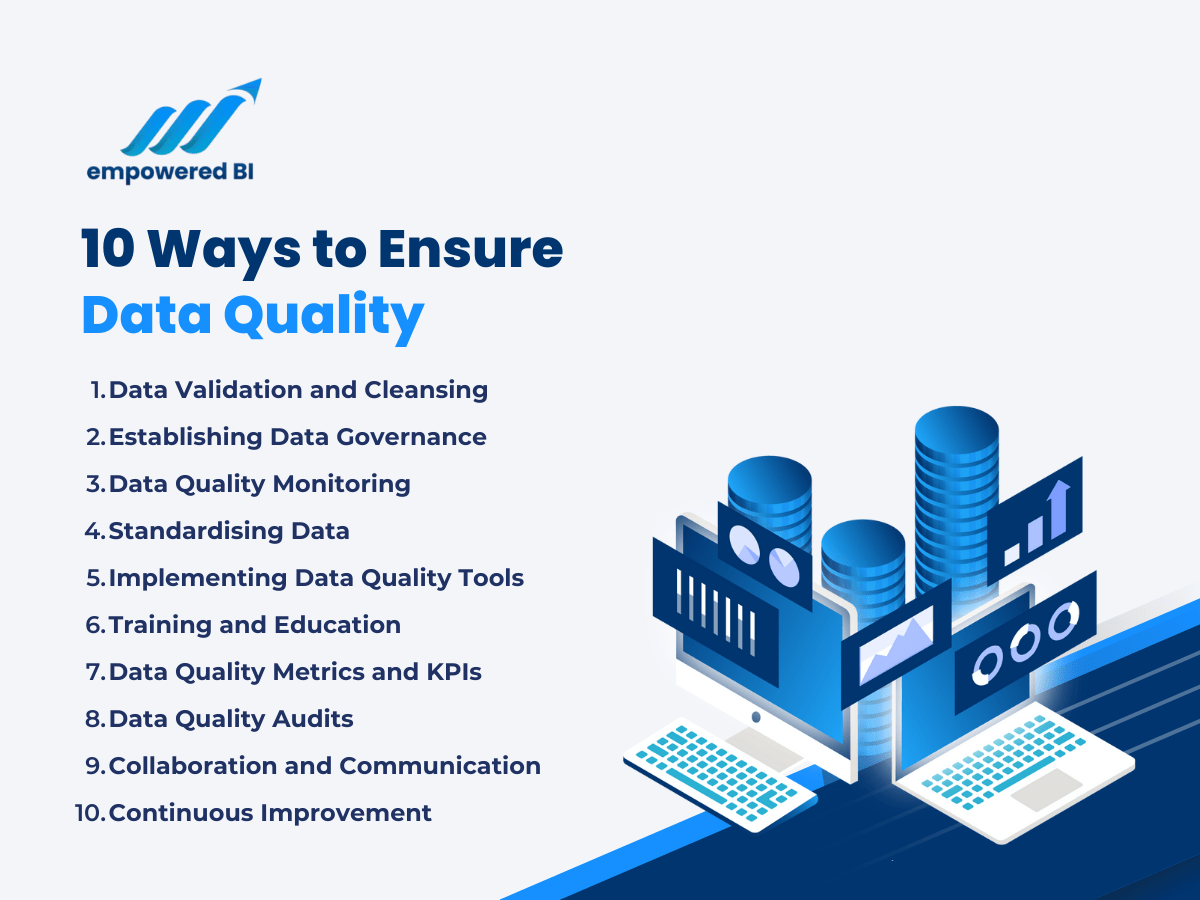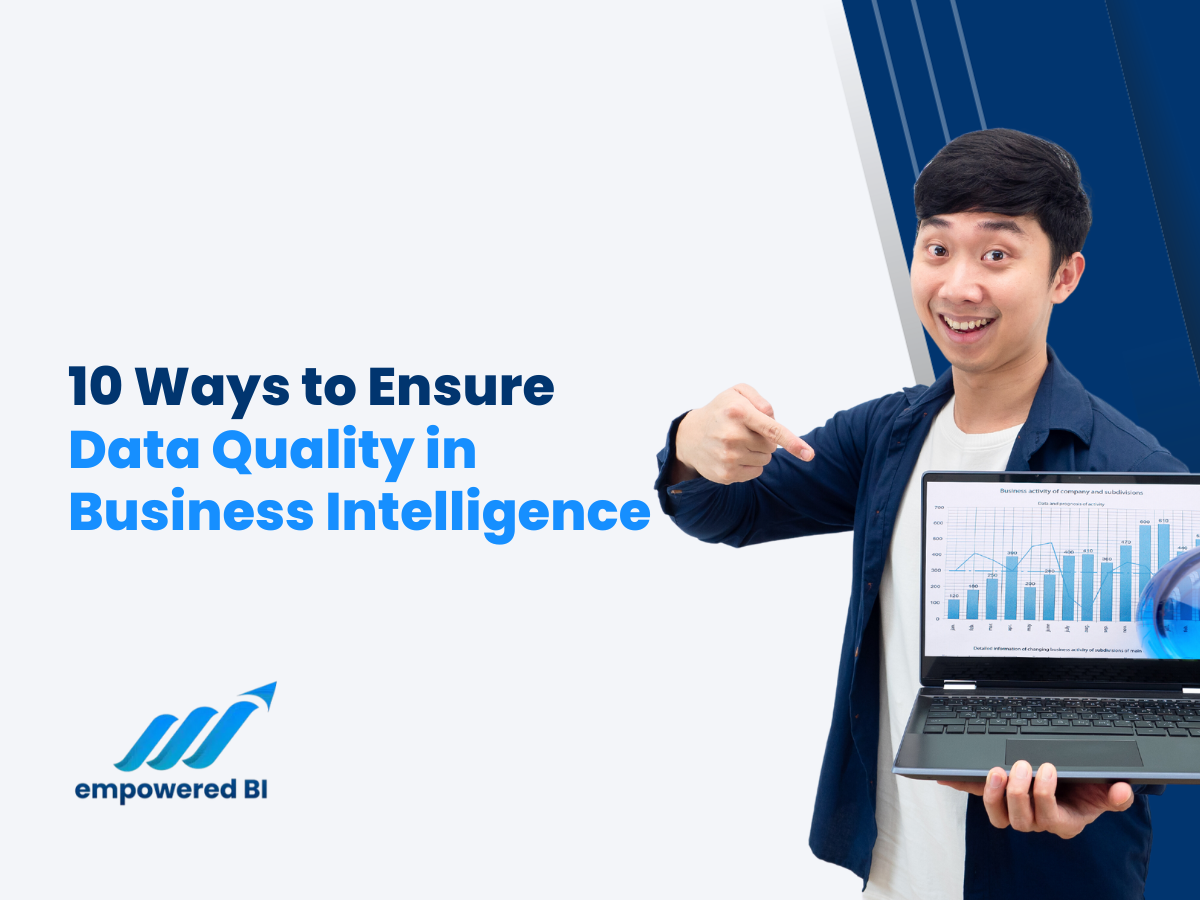In today’s data-driven landscape, business intelligence has emerged as a linchpin for informed decision-making, strategy formulation, and competitive advantage. However, the success of any business intelligence initiative hinges upon one critical factor: the quality of the data at its foundation.
Without reliable and high-quality data, even the most advanced analytics tools and algorithms can falter, leading to misguided insights and costly missteps. To harness the full potential of business intelligence, organisations must prioritise data quality as a top priority.
To help you with that, this article will explore ways to ensure data quality in business intelligence. These Data Quality Strategies, techniques, and best practices will equip you with the knowledge and tools to maintain impeccable data quality, empowering your BI efforts to yield meaningful, actionable insights that drive success and innovation.
What is Data Quality in Business Intelligence?
In business intelligence, data quality refers to the correctness and precision of the information collected. It ensures that the data reflects reality and is free from errors or discrepancies. It encompasses various aspects such as accuracy, completeness, consistency, and data reliability. Here are the differences between these elements:
- Accuracy refers to the correctness and precision of the information collected. It ensures that the data reflects reality and is free from errors or discrepancies.
- Completeness focuses on having all relevant information available for analysis. It ensures no missing or incomplete records could skew results or hinder a comprehensive understanding of the business landscape.
- Consistency in data refers to its uniformity across different sources and timeframes. Consistent data allows for meaningful comparisons and reliable trend analysis.
- Reliability is another critical aspect of data quality in business intelligence. Reliable data can be trusted to provide consistent results over time and across different scenarios. It should be free from biases or anomalies that could distort insights or lead to incorrect conclusions.
What is the Importance of Data Quality for Reliable Insights?
In today’s data-driven world, businesses heavily rely on high-quality data to make informed decisions, drive strategic initiatives, and gain a competitive edge. Accurate data ensures that organisations have reliable information to analyse and interpret. It helps identify trends, patterns, and insights that can guide business strategies and improve operational efficiency.
Likewise, here are several key reasons why data quality is crucial for generating reliable insights:
10 Ways to Ensure Data Quality in Business Intelligence
Organisations need robust data governance practices that include regular monitoring, validation processes, cleansing techniques, and adherence to industry standards to maintain high-quality data. Here are some data quality tips:

1. Data Validation and Cleansing
Data validation ensures that the data collected or entered into a system meets specific predefined standards or criteria. It involves checking for accuracy, consistency, completeness, and adherence to rules or formats.
On the other hand, data cleansing refers to identifying and correcting or removing errors or inconsistencies in a dataset. It involves tasks like deduplication, standardisation, normalisation, and verification. Data cleansing aims to improve overall data quality in business intelligence by eliminating redundancies and enhancing accuracy.
Through this, organisations can identify and rectify issues before they impact decision-making processes.
2. Establishing Data Governance
Data governance refers to the framework, processes, and policies to ensure an organisation’s data assets’ quality, availability, usability, and security. It involves defining roles and responsibilities for data management, establishing data standards and guidelines, implementing data protection measures, and monitoring compliance.
A robust data governance program can help organisations gain several benefits. Firstly, it helps ensure that the collected data is accurate and reliable. This is crucial for making informed business decisions based on trustworthy information. Secondly, it aids in compliance with various regulatory requirements such as GDPR (General Data Protection Regulation) or CCPA (California Consumer Privacy Act). Organisations can mitigate risks associated with unauthorised access or misuse of sensitive information. Furthermore, a well-established data governance framework promotes collaboration across different organisational departments. It enables effective stakeholder communication, managing and utilising the organisation’s data assets.
3. Data Quality Monitoring
Data quality monitoring continuously assesses and ensures data accuracy, completeness, consistency, and reliability within an organisation. It involves implementing robust systems and tools that enable organisations to monitor their data in real-time or periodically. This consists of monitoring various aspects of data, such as its source, format, integrity, and adherence to predefined quality standards.
Through monitoring, companies can identify any anomalies or discrepancies in the data and provide alerts or notifications for immediate action.
4. Standardising Data
Standardising data is the process of organising and formatting data consistently and uniformly. It involves transforming data into a common format that is easily understood and analysed by different systems, applications, or users.
Standardising data helps overcome these challenges by establishing rules or guidelines for structuring, labelling, and representing data. This ensures that all the data within an organisation follows a consistent format and can be easily compared or combined.
Businesses can improve their analyses and report accuracy and reliability by standardising data. It allows for easier integration between different systems or databases, enabling seamless information sharing across departments or even with external partners.
5. Implementing Data Quality Tools
Data quality tools can help automate identifying, correcting, and monitoring data quality issues. These tools help maintain data consistency, accuracy, and integrity by proactively detecting errors and inconsistencies in large datasets. They streamline data quality management, making it more efficient and less error prone.
Utilise data quality software and tools to automatically detect and correct your data’s errors, inconsistencies, and inaccuracies. These tools can help standardise data formats, validate data against predefined rules, and provide real-time data quality monitoring.
6. Training and Education
Training and education are essential to ensure employees understand data quality’s significance in business intelligence. It empowers staff to adhere to data quality standards, follows best practices in data entry, and recognise potential data issues, thereby preventing errors at the source.
As such, you should always invest in training programs to educate your team members about the importance of data quality and how to maintain it. Ensure that employees understand data entry best practices, data governance policies, and data quality standards.
7. Data Quality Metrics and KPIs
Data quality metrics and key performance indicators (KPIs) serve to quantify and measure data quality. They provide a clear and objective way to assess data accuracy, completeness, consistency, and other relevant aspects. By establishing these metrics, organisations can set benchmarks, monitor progress, and prioritise areas for data quality improvement.
Likewise, defining key data quality metrics and performance indicators (KPIs) aligning with your business objectives is essential. These metrics include accuracy, completeness, consistency, timeliness, and reliability. Regularly measure and report on these metrics to track improvements.
8. Data Quality Audits
Data quality audits are conducted to evaluate the state of data within an organisation systematically. The purpose is to identify data quality issues, assess the effectiveness of data management processes, and pinpoint areas that require attention or improvement. Audits provide a structured and thorough examination of data to ensure its reliability and fitness for use.
Conduct regular data quality audits to assess the state of your data. These audits thoroughly examine data sources, processes, and controls to identify issues and gaps. Implement corrective actions based on audit findings.
9. Collaboration and Communication
Collaboration and communication are vital for data quality in business intelligence because they facilitate sharing of knowledge and concerns among different teams and stakeholders. This aims to create a culture of data stewardship and transparency, where individuals can report data issues, collaborate on data-related projects, and collectively work towards maintaining high-quality data.
As such, organisations must foster a culture of collaboration and communication among departments that use and contribute to the data. Encourage data owners, stewards, and users to communicate issues and concerns related to data quality. Establish clear channels for reporting data quality problems.
10. Continuous Improvement
Data quality in Business Intelligence is a continuous and adaptive process. Through continuous improvement, organisations can respond to changing data needs, evolving business requirements, and emerging data quality challenges. This iterative approach helps maintain data quality over time.
Likewise, treat data quality as an ongoing process rather than a one-time task. Continuously monitor, assess, and improve quality by identifying root causes of data errors and implementing preventive measures. Regularly review and update data quality standards and procedures.
Ensure Data Quality with empowered BI!
In conclusion, maintaining data quality is paramount in Business Intelligence, as the insights and decisions drawn from data heavily depend on its accuracy and reliability. By implementing these data quality tips, businesses can safeguard the integrity of their data. To guarantee that your organisation’s data is of the highest quality and to unlock the full potential of your Business Intelligence endeavours, partner with empowered BI. Contact us now!

